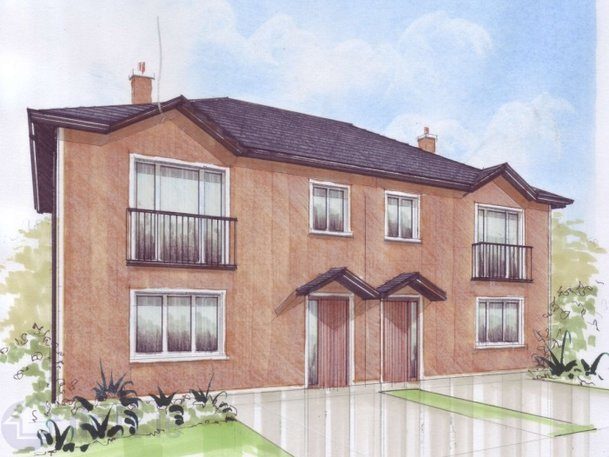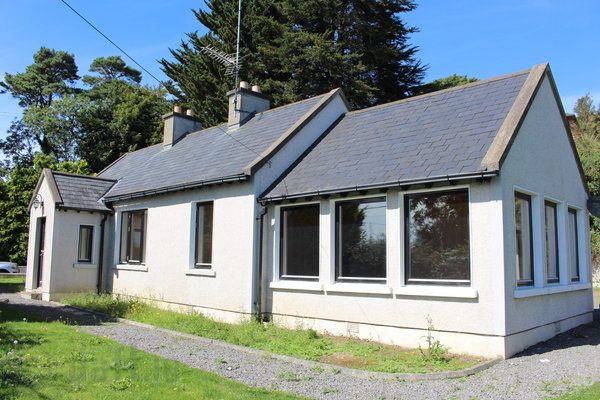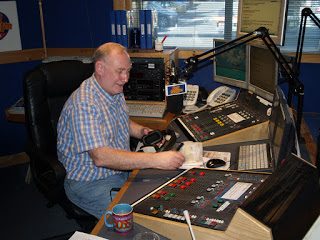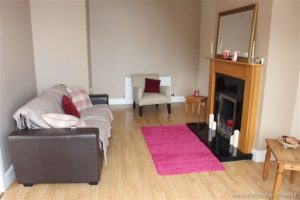Wexford builder is the new chairman of IHBA

Congratulations to Wexford builder, Anthony Neville, of Anthony Neville Homes, on his recent appointment as Chairman of the Irish Home Builders Association (IHBA) for 2017 and 2018.
It is great to see a provincial builder at the helm, particularly at such an important time for residential building. He has pledged to address the main issues hindering new development outside of Dublin, namely, the high cost of building, and he is optimistic about development prospects here in the South East. Shortly after his appointment, he had the following to say:
“We have seen in some areas of provincial Ireland that house building has recommenced again. This is only in areas where the sales price of houses has exceeded the construction costs, therefore creating a margin that makes it viable for the homebuilders to secure finance from their financial institutions and build much required homes. We, at Anthony Neville Homes, have been lucky over the last number of years to have had exposure to the greater Dublin area on our sites in Maynooth, Kinsealy and Saggart, where we have seen continuous demand for our product. However, over the last 12 months we have noticed the increase in demand spreading down through Wicklow to our site at Baltinglass and hopefully we will be recommencing construction at one of our Enniscorthy sites in Co. Wexford. Members of the IHBA have experienced increased demand in places such as Gorey, Kilkenny, Portlaoise and Tullamore, so whilst the recovery is taking a lot longer than we had hoped, it is spreading gradually further away from Dublin.”
Help-to-Buy under threat
Anthony is also a strong supporter of the help-to-buy(HTB) scheme and has spoken out about the need to retain the initiative after news last week that the aid scheme for first-time buyers might be shut down. This is certainly positive for first-time buyers who are eligible for the scheme but perhaps not for those who have worked outside of Ireland for the last few years and are finding themselves at a disadvantage when it comes to bidding on property back in Ireland. The application of the tax relief means that eligible first-time buyers can outbid non-eligible buyers (of equal financial status) for the same property but it only applies to new homes.
In fact, buyers who are not entitled to avail of the HTB relief are much better off looking at contemporary or recently built second-hand homes. This offers a good opportunity for sellers and those thinking of selling in 2017. If you are considering selling and want to know a bit more about your market and about demand for your particular property locally, just contact us for a quick and confidential chat.
The M11 motorway has made towns like Arklow and Gorey much more attractive to buyers. Here at Kinsella Estates, we are currently listing a great three-bed semi-detached house in Arklow, just five minutes off the M11 motorway and less than 40 minutes from Dublin.
Link to further details here:
This beautiful property is presented in showhouse condition. Call us now to arrange a viewing on +353 53 9421718. Also, don’t forget that we accommodate house-hunters and buyers from outside of Ireland and can do a virtual walkthrough of this or any of our other listed properties. If you need extra help, just ask!
For specific queries or to speak with a local property expert about your buying and selling needs in Wexford, Wicklow and surrounding areas, contact Michael, Alan or Eileen Kinsella at kinsellaestates.ie .
Email me directly on michael@kinsellaestates.ie or telephone : +353 53 94 21718
Your Guide to the Help-to-Buy Scheme

Budget 2017 announced the Help-to-Buy scheme, which has proven controversial within the industry, to help intending first-time buyers to put together the deposit required to purchase or self-build their new house or apartment.
The scheme works by way of an income tax and DIRT tax refund, in respect of payments made over the previous four tax years. There are three types of applicants who can apply for the Help-to-Buy scheme, namely: retrospective applicants or buyers whose contracts are signed between 19 July 2016 and 31 December 2016; first-time buyers whose contracts are signed between 1 January 2017 and 31 December 2019; and first-time self-build applicants building between 1 January 2017 and 31 December 2019.
Eligibility:
- The buyer must be a first-time buyer, specifically, the buyer must not have either individually or jointly with any other person (directly or indirectly), previously purchased, or built a property. Where more than one individual is involved in purchasing or building a new home, all of the individuals must be first-time buyers.
- The house or apartment must be a new-build (may be self-built)
- The purchase must be dated between 19 July 2016 and 31 December 2019
- The property must have been purchased or built as the first-time buyer’s home and not acquired for investment purposes.
- The property must be occupied by the first-time buyer, or at least one of the first-time buyers in the case of multiple first-time buyers (a group), for a period of five years.
How to apply:
- Registered for myAccount (PAYE) or ROS (self-assessed)
- PAYE taxpayers will need to complete Forms 12 (available through ROS) for the tax years selected for refund
- Self-assessed taxpayer will need to complete Forms 11 (available through ROS) for each of the four years immediately prior to the claim. Please not that any outstanding taxes must be paid.
In order to apply for the scheme/refund, buyers must enter the following information online:
- Property details including address and price
- Details of each first-time buyer and refund agreed
- Developer/Contractor details or
- Details of the Solicitor if self-building
- Upload a copy of the signed
- Balance of the deposit to be paid
- Contract completion date
- Mortgage details
- For self-builders, proof of drawdown of the first mortgage tranche payment
All details must be verified by the Developer/Contractor in the case of a new build, or by the purchaser’s Solicitor in the case of a self-build, before the refund can be paid out.
For further details on the scheme, contact the Office of the Revenue Commissioners
For specific queries or to speak with a local property expert about your buying and selling needs in Wexford, Wicklow and surrounding areas, contact Michael, Alan or Eileen Kinsella at kinsellaestates.ie . Alternatively, you can email me directly on michael@kinsellaestates.ie or telephone : +353 53 94 21718 to arrange a viewing on our qualifying new builds.
Tips For Selling Your Rural Home

Over the last few years we got to learn a lot more about the property market than ever before. We have websites like Daft.ie listing most properties for sale around the country together with the asking prices, we have the National Property Price Register telling us achieved sales prices and, most recently, the CSO has started including cash purchases rather than just reporting on mortgaged property transactions. All of this is helpful, it improves transparency in the marketplace and that’s good for everyone, not just buyers and sellers but us agents too! The only problem is that most of the statistics are coming from the sale of town houses and apartments. It is much more difficult for rural homeowners to gauge the value of their home and particularly if their home has lands adjoining. For rural homeowners thinking of selling, definitely talk to us and we can let you know about recent sales, achieved prices locally and current ready buyers in the market.
For rural properties, often times, there are fewer interested buyers but this is not necessarily a bad thing. It can mean less time wasting as only very interested parties tend to view. Of course, this also means that it is crucial to get the listing, marketing and presentation right from the start. It’s a cliché that there is only one opportunity to make a first impression but it’s also true. A disappointed house-hunter will rarely re-visit or re-consider a property that they have already ruled out just with the promise of a clean-up or painting job.
When I or any of the team here at Kinsella Estates visit a home (before listing it for sale) we will always give feedback on the current presentation and give advice on any changes or cost-effective improvements that are likely to either increase the value of the home or increase the attractiveness of the property to buyers.
When it comes to doing this suggested work, we can always advise on what repairs or maintenance are necessary or those that will generate a return. It is not about renovating your home prior to sale, this is unlikely to ever make financial sense for homeowners.
Ways to prepare your rural home for sale is to put together area and property maps, good quality photos if you have them although we will always take professional quality images for the sales brochure, and definitely compile a list of contents included in the sale. We will always position a rural property by giving driving distances to the next largest towns, as this helps potential buyers who might be unfamiliar with the vicinity to decide if the location works for them. As part of our online listings, Kinsella Estates will accurately pinpoint your location on Google Street View (an interactive satellite map) so that interested buyers can find your property, also, they can get a sense of where it is in relation to neighbouring towns.
In my experience, including proximity to local schools, clubs and other facilities is helpful. We understand that no-one knows the property as well as the owner so we will listen to what you have to tell us and then package that information for interested viewers.
While it might sound a bit unusual, I advise sellers to put together the most recent utility bills, bin collection information and any other relevant information that a prospective buyer would need to know about the running of the property. In recent years, buyers are aware of new septic tank regulations and will certainly be looking for evidence of compliance as standard. Internally, a clutter-free environment is the most important thing. Neutral decor is generally a safe bet, buyers don’t mind an older or dated property provided they can see the potential and the best way to show people potential it to empty it as much as possible. The practice of clearing your home prior to sale is not just good for presentation, it is also a great way to get a head start on moving!
Do not underestimate the power of curb appeal; in truth, the first impression is made as the house-hunters turn into your laneway or drive. With that in mind, keep hedges trimmed, mow lawns and most importantly, remove junk from around the house and sheds. Potted plants can brighten up any yard so this is an easy way to improve the overall impression. Also, give the entrance pillars a coat of paint, remove weeds and make the drive accessible for multiple cars, if possible.
Even animal lovers will panic of they are greeted by a pack of barking dogs upon arrival; please ensure that all pets are under control during viewing times. Similarly, if you have animals in paddocks around the home, do let us know about any special precautions needed when showing people around.
Finally, because rural homes are unique, please do understand that interested buyers are likely to have lots of questions, they will want the view the property more than once and will probably take a bit longer to make a decision. Remember this is all leading to you finding the right buyer (or letting the right buyer find you and your home!).
For specific queries or to speak with a local property expert about your buying and selling needs in Wexford, Wicklow and surrounding areas, contact myself (Michael), Alan or Eileen Kinsella at kinsellaestates.ie .
You can email me directly on michael@kinsellaestates.ie or telephone : +353 53 94 21718
From the Horse’s Mouth: Housing in Budget 17
Coveney announces transformational housing budget
- 50% increase in housing budget for 2017
- Housing needs of over 21,000 being met in 2017
- Funding for 3,000 exits from emergency accommodation in 2017
- New First Time Buyers initiative – 5% of purchase price, max €20k
 The Minister for Housing, Planning, Community and Local Government, Mr. Simon Coveney,T.D., today (11 October 2016) welcomed significant additional funding allocated for 2017 to underpin Rebuilding Ireland the Government’s Action Plan for Housing and Homelessness. In Budget 2017, the Government is allocating €1.2 billion to housing programmes, a 50% increase over 2016. Thi
The Minister for Housing, Planning, Community and Local Government, Mr. Simon Coveney,T.D., today (11 October 2016) welcomed significant additional funding allocated for 2017 to underpin Rebuilding Ireland the Government’s Action Plan for Housing and Homelessness. In Budget 2017, the Government is allocating €1.2 billion to housing programmes, a 50% increase over 2016. Thi
s investment will see the housing needs of over 21,000 households being met in 2017. In addition, local authorities will fund a range of housing services to the value of €92 million from surplus Local Property Tax receipts, bringing the total housing provision in 2017 to almost €1.3 billion.
Speaking after Budget 2017 was announced, Minister Coveney said:
“What I am announcing today represents a transformational budget for housing in Ireland. I said at the launch of Rebuilding Ireland in July that meeting the housing challenge is the key priority for this Government. The package of measures I am announcing with Cabinet colleagues demonstrates the extent of that commitment. The investment provided by the Exchequer and by local authorities will allow us to meet the housing needs of 21,050 families in 2017. As part of this, I am providing an increase of €28m in funding for homeless services, underscoring the particular priority I attach to this issue, including the provision of emergency supports for rough sleepers and ending reliance on the use of hotels for homeless families by mid-2017.
The Budget also contains a comprehensive package of supports for the wider housing market in terms of a significant tax rebate for first time buyers to stimulate the supply of new homes; extension of mortgage interest relief for existing homeowners; and changes to Capital Acquisitions tax The rented sector is a key focus under Rebuilding Ireland and in this Budget we have introduced a number of important supply incentives including improvement in mortgage interest relief for landlords, increase in the ceiling for the rent-a-room scheme, extension of the Living City initiative to rental properties and supports for new student accommodation. This is in advance of the delivery of a comprehensive strategy for the rental sector which I will publish before the end of the year.
Total funding for my Department in 2017 is €1.78 billion compared to €1.38 billion this year. This includes €702m in capital funding – an increase of 48% on 2016 and €1,075m in current funding which is an increase of 18% on this year. Overall, the increase of €394m or 28% on 2016.The bulk of the increase is going to housing which is the Government’s number one priority issue. An additional €2m is also being provided in 2017 for the RAPID programme for disadvantaged areas and a new Community Facilities Fund is being included, with an initial €2m being provided in 2017.
The proposed Department Vote 2017 is €1.777 billion (€702m Capital and €1,075m Current) an increase of nearly 30% since 2016 (€1.383 billion).”
Detailed breakdown of each sector
Housing Delivery
- The total exchequer Housing allocation in 2017 will be €1.2 billion. This is broken down into €655m in capital and €566m current funding.
- This compares to €814m in 2016 (€432m Capital, €382m Current). This is an increase in the total Exchequer allocation for housing of €400m, which represents a 50% increase over 2016.
- Local Authorities will also provide funding for Housing in 2017 (LPT self-funding) amounting to €77m Capital and €15m Current. This will bring overall housing allocation to 1.3bn
- Funding under the Housing Programmes will deliver 21,050 units in 2017 through the full range of social housing supports.
- Increased funding for the provision of housing adaptation grants will enable some 9,000 grants to be made in 2017, thereby assisting older people and people with a disability to remain in their own homes and communities.
- Capital of €9m is to be provided in 2017 for Traveller-specific accommodation, an increase of 64%, which will also support the carrying out of fire safety works in traveller accommodation.
- An additional 400 dwellings have been targeted for Pyrite remediation in 2017 through investment of €22 million.
Capital
A total capital provision of €732m (Exchequer provision up 51% on 2016) has been allocated in 2017 and will support the delivery of 4,450 units through the Local Authority and AHB construction and acquisitions programme. This also includes Rapid Builds, units to be delivered through Part V mechanisms, returning vacant units to productive use and delivery of new units under the National Regeneration Programme.
Current
A total provision of €581 million has been allocated in 2017 and will support the delivery of 16,600 units through:
- An allocation of €152.7m (+€105m on 2016) for the Housing Assistance Payment which will enable a further 15,000 households to be accommodated and also support the ongoing costs of 17,000 existing HAP tenancies;
- Funding of €134 million will support a further 1,000 new transfers under the Rental Accommodation Scheme; and
- An increased funding provision of €84 million (+€27m on 2016) under the Social Housing Current Expenditure Programme will support the delivery of 600 direct leased units in 2017. In total, 2,250 units will be delivered in 2017 under the Social Housing Current Expenditure Programme
Homelessness
- A 40% increase in homeless funding from €70m this year to €98m in 2017 will ensure that the increased demand for emergency homeless services is effectively addressed and will assist in supporting homeless households with long term and sustainable housing solutions.
- The increased budget reflects the additional costs of emergency accommodation and homeless services until the housing and homelessness actions & initiatives in Rebuilding Ireland results in hotels only being used as emergency accommodation in limited circumstances by mid-2017.
- In 2017 through a range of funding mechanisms, there will be provision for 3,000 exits from emergency accommodation achieved through mainstream social housing tenancies, rapid build houses and the Housing Assistance Payment.
- The increased budget will assist towards the tripled target of moving 300 people from homelessness into supported tenancies in the Dublin region through the Housing First programme and its extension to other major urban areas.
- These measures will be supported by increased funding in the areas of mental health and addiction from the Department of Health and additional supports for children and families in from the Department of Children & Youth Affairs.
Increasing Supply
First Time Buyers – Help-to-Buy, Mortgage Interest Relief, CAT
- 5% tax rebate for first time buyers of new builds up to €400,000. This is a supply side driver that will be available from 19 July to end 2019
- Maximum rebate of €20,000 applies to properties from €400,000 to €600,000.
- No rebate for properties above €600,000.
- Extension of mortgage interest relief beyond 2017.
- Increased threshold from €280,000 to €310,000 for transfers from parents to children in respect of Capital Acquisitions Tax.
Local Infrastructure Housing Activation Fund
- €200m fund to relieve critical infrastructural blockages and enable the delivery of large scale housing on key development sites.
- This has the potential to open up lands and deliver housing of the order of 15,000 to 20,000 units by 2019.
Planning
- Additional funding is being provided to An Bord Pleanala to support implementation of the new fast-track measures for streamlining the application process for large residential developments, in line with commitments in Rebuilding Ireland.
Bringing vacant properties back into use
Housing Agency Rotating Fund
- The Housing Agency is being provided with €70m capital funding to engage with banks and investment companies to acquire properties for social housing nationally. This will deliver 1,600 units over the period to 2020.
Repair & Leasing Initiative
- New Repair and Leasing Initiative will allow local authorities to provide financial assistance to property owners to bring vacant properties up to standard which can then be leased for social housing. Capital provision of €6 million in 2017 will deliver 150 units under this new initiative.
Buy & Renew Initiative
- A new Buy and Renew initiative will support local authorities and approved housing bodies to purchase private housing units in need of remediation, renew them and make them available for social housing use. An initial capital provision of €25 million will be available for this initiative in 2017.
Living City Initiative
- Changes designed to increase uptake. Maximum floor area restriction is being removed. Requirement for properties to have been used as residential dwelling to avail of support is also being removed, and qualification thresholds are being changed.
Local authority voids
- 800 vacant units will be brought back into use in 2017.
Supporting the Rented Sector
- Mortgage Interest Relief to be fully restored from 75% to 100% over a five year period. Increasing from 75% to 80% in Budget 2017.
- Extension of Living City Initiative to landlords to support investment in rented market.
- Rent a Room ceiling increased from €12,000 to €14,000.
- Strategy for the rental sector will be delivered by end 2016 – work underway at present.
Student Accommodation
- New ISIF support for new investment in student accommodation
- Rent a Room ceiling increased from €12,000 to €14,000
- Higher Education Institutions accessing low cost loan finance from the Housing Finance Agency.
Home Renovation Incentive
- 2 year extension of relief until end 2018 to allow homeowners avail of income tax credit of 13.5% incurred on repair, renovation, or improvement work carried out on residential dwelling.
Community
- €78.2m is provided in 2017 for Community Programmes (€9.6m Capital and €68.6m current) – an increase of 10% on 2016.
- The bulk of the funding relates to Supports for Community and Voluntary Sector (€12.3m) and SICAP (€42.4m).
- Additional funding is being provided in 2017 for the RAPID programme (€2m) and a new Community Facilities Fund (€2m)
Water Services
- €46.5m (Capital €23m and Current €23.5m) is being provided in 2017.
- The bulk of the Capital funding (€17.8m) relates to the Rural Water Programme
- Current funding is provided to support initiatives under the Water Quality Programme. The main focus of this programme is to provide funding for Water Quality, primarily the investment in statutory environmental and public health compliance.
Local Government
- €385m is provided in 2017 under Local Government Programmes (€8.5m Capital and €376.6m Current)
- The Capital expenditure relates to Fire and Emergency Services
- Current Expenditure relates to Franchise (€1.4m), Fire and Emergency Services (€800k) and a payment from the Exchequer to the LGF of €365m
ENDS
Helping Returning Buyers
Unsurprisingly, the past decade has seen massive emigration from Ireland. But the movement of people does not affect all areas equally. Not only are younger rural dwellers more likely to emigrate, but those who remain are more likely to move from their local areas into larger towns and cities. This effectively shifts the population away from rural areas into the main cities and, in the past, the only way to halt or reverse this was to encourage large-scale employment in the rural areas. But as the economy recovers, this trend is starting to shift slightly. In the last year or two, we are starting to see the return of our more recent emigrants. Specifically, we are starting to see these people – who are or have been working on contract basis in the high-tech or telecommunications sectors in Australia or Asia – plan a return to Ireland. For some, the move to Ireland is immediate, for others, they will work abroad for another few years before returning permanently. For many, they will continue in their contract roles, with their existing employers after they return to Ireland. As remote workers, they can generally work from anywhere in the world.
These buyers are typically Irish, or with an Irish partner, living and working overseas for much of the past decade and with cash savings in excess of €50,000. Many have multiples of this amount and do not require any mortgage funding. While these buyers do not appear in national statistics as first-time buyers, they usually are, and they appear as investors, despite buying the homes to eventually live in themselves.
What most returning buyers want is a property that will work as a good investment initially until they return to Ireland, at which time they need it to function as a home for some length of time. This is a tricky balance to achieve. Generally, a suitable family home will be more expensive than suitable rental home but will not achieve a higher rental income. Similarly, an affordable rental/investment property might not be in the type of setting that makes a long-term family home. There is certainly a fine balance with this, and when added to the fact that these buyers tend to be researching and buying while still overseas, the process can be difficult. One of the major challenges experienced by buyers overseas is that some auctioneer firms are reluctant to engage with them or to accept bids from ‘unknown’ bidders. This can be frustrating for buyers, especially for those who are unable to get back to Ireland on a regular basis. The technology exists for buyers to see the area, the street, the property and full 360 degree views of every nook and cranny internally; booking deposits can be transferred on-line; buyers, together with their solicitors, can complete a Power of Attorney to facilitate conveyancing… There is no reason not to deal with buyers in Australia in much the same way as we would deal with buyers who walk into our offices!
Here at Kinsella Estates, we understand that returning buyers have enough on their plates without trying to master the finer details of sourcing an investment property as compared with house-hunting for their family home. We now have a dedicated team member, Aisling, who will be helping remote buyers work through their buying requirements, she can carry out viewings on their behalf and unlike other estate agencies, we have adopted a policy of accepting bids from qualified remote buyers. By ‘qualified buyers’, we are referring to those who have supplied us with proof of identification, as required to satisfy anti-laundering legislation, and proof of funds.
If this is something that you need or are interested in finding out more about, contact Aisling in our office or you can email me directly on Michael@KinsellaEstates.ie with your Skype (or similar) contact details.
For specific queries or to speak with a local property expert about your buying and selling needs in Wexford, Wicklow and surrounding areas, contact Michael, Alan or Eileen Kinsella at kinsellaestates.ie.
Email me directly on michael@kinsellaestates.ie or telephone : +353 53 94 21718
East Cost FM: Is South Wicklow Looking More Attractive to Commuters?
Gorey (in County Weford) to Dundrum (Dublin) in less than an hour off-peak?
Last week on East Coast FM, The Morning Show presenter, Declan Meehan, was joined by Carol Tallon, Author of the Irish Property Buyers Handbook annuals to discuss the shortage of homes to buy and rent in County Wicklow.
And while it is true, there is a shortage in North Wicklow, 30 to 40 minutes south offers starter homes below €100,000, and detached four-bed homes from €140,000. Given that little new development is in the pipeline for 2016/2017 (based on commencement notices served with Wicklow local authority). Two of our newly listed properties in Carnew and Coolattin were given as examples of the better value to be had a little further south. (See all of our listings here: http://kinsellaestates.ie/residential/ireland/property-for-sale)
The issue of commuting time came up on-air and whether, in fact, it was possible to make it from Gorey (in County Weford) to Dundrum (Dublin) in less than an hour off-peak? The answer is ‘definitely’! With the expansion of the M11, we are finding more and more first-time buyers coming as far south as Gorey in search of the space and value they need in their new home.
If you are thinking of extending your house-hunting area but are unsure of the locality and various town/villages that might be worth exploring, talk to us about our house-hunting service in Wicklow and Wexford: http://kinsellaestates.ie/ResidentialServices
Listen back to the show here: http://www.eastcoast.fm/on-air/morningshow/listenback


